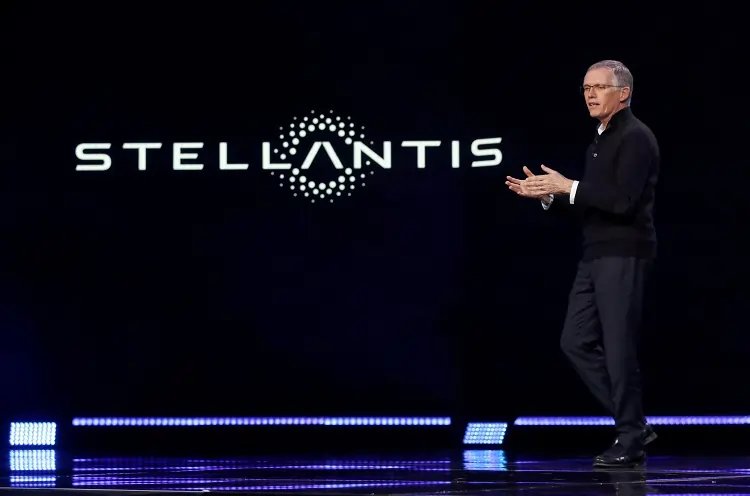Tavares clashed with Stellantis board over revival plan, sources say


By Giulio Piovaccari and Alessandro Parodi
MILAN (Reuters) – Outgoing CEO Carlos Tavares clashed with Stellantis’ board over his plans to quickly turn around the ailing U.S. business by cutting costs, rather than focusing on long-term strategy, investors and bankers familiar with the matter said on Monday.
Shares in the Jeep, Fiat and Peugeot manufacturer slumped as much as 10%, hitting their lowest since July 2022, as investors worried about the vacuum left at the top of the world’s No. 4 carmaker following Tavares’ resignation on Sunday.
Stellantis is struggling to get rid of overcapacity and bloated inventory in its key North American market, at a time when global demand remains sluggish and competition from Chinese rivals, especially in electric vehicles, is intensifying.
In addition to its U.S. travails, the company’s focus on raising prices among its mass-market marques has driven away inflation-hit customers in its other important market, Europe.
Stellantis had said shortly after a shock profit warning in September that Tavares would retire in early 2026, at the end of his current term. The process to select a new CEO was initially set to be completed by the final quarter of next year.
Interviews with half a dozen shareholders, bankers and analysts show how quickly since then disagreements deepened between Tavares – long one of the auto industry’s most respected executives – and the board over how to resolve the crisis.
A senior investment banker briefed on the matter said on Monday that the board had grown concerned about Tavares’ strategy for turning things around.
In recent months, and with just over a year left of his contract, the CEO had focused mainly on cutting costs, the banker said. The board worried that was leading to quality issues but also cramping the company’s ability to develop and design new models.
Customers and dealers were furious about Tavares’ strategy, the banker said.
Launches of some key models, like the new version of the popular Peugeot 3008 mid-sized SUV and the budget Citroen C3 city car, with its electric version e-C3, have faced delays.
A source familiar with the matter told Reuters on Sunday that tensions grew because the board felt Tavares was focused on finding near-term solutions to save his reputation rather than working in the best interests of the company.
Stellantis declined to comment and Reuters could not reach Tavares on Monday.
Tavares’ cost-cutting had hurt in particular his relationship with U.S. dealers and the U.S. United Auto Workers union, analysts said.
In a Sept. 10 letter to Tavares, Stellantis national dealer council president Kevin Farrish complained that the pursuit of short-term profits meant “rapid degradation” of the Jeep, Dodge, Ram and Chrysler brands, adding: “You created this problem”.
The UAW has threatened to strike against the automaker over delayed investments, prompting lawsuits from Stellantis accusing the union of breach of contract.
Another sticking point for investors was Tavares’s hardline approach to the European Union’s upcoming tougher emissions targets at a time of slowing EV sales, said Massimo Baggiani, founder at Niche Asset Management and a Stellantis shareholder.
It “frightened” investors and major shareholders, he said.
CEO Tavares repeatedly confirmed pledges by Stellantis to meet the EU goals and said last-minute changes or delays to the regulation, as proposed by European auto lobby ACEA, were unfair.
New rules known as Corporate Average Fuel Economy (CAFE) from Jan. 1 will require around 21% of the firm’s total sales during 2025 to come from electric vehicles.
Should it miss the target, it will have to pay other companies with lower emissions to pool emissions and reduce their average CO2 emissions or pay a fine.
Stellantis’ current EV sales mix in the EU is around 12%.
Europe chief Jean-Philippe Imparato warned last month in an interview with Italian newspaper Milan Finanza that fines could be as much as 3 billion euros ($3.1 billion) if it did not manage to comply.
Tavares’ early exit despite his determination to turn things around before 2026 shows how serious the problems at the group are, Bernstein analyst Stephen Reitman said.
“It points to what we’ve said for a long time – that the problems are very deep and they’re not easily fixed now,” he said.
($1 = 0.9519 euros)
(Reporting by Giulio Piovaccari and Alessandro Parodi; Writing by Josephine Mason; Editing by Catherine Evans)
Corporate governance refers to the systems, principles, and processes by which a company is directed and controlled, focusing on the relationships among stakeholders.
Cost-cutting involves reducing expenses to improve profitability, often through measures like layoffs, reducing operational costs, or eliminating non-essential services.
Electric vehicles (EVs) are automobiles that are powered by electricity instead of traditional fuels, offering a cleaner alternative to reduce emissions.
Market performance refers to how well a company's stock performs in the market, often measured by stock price changes and overall investor sentiment.
A turnaround strategy is a plan implemented by a company to reverse a decline in performance and restore profitability, often involving restructuring and cost management.
Explore more articles in the Business category











